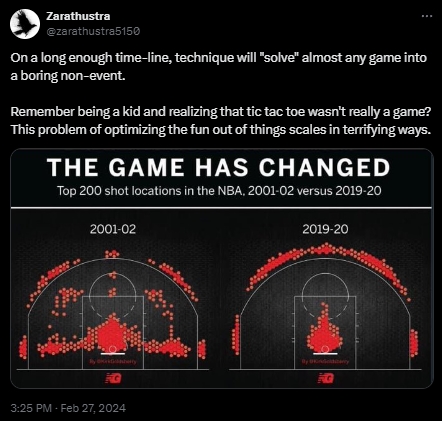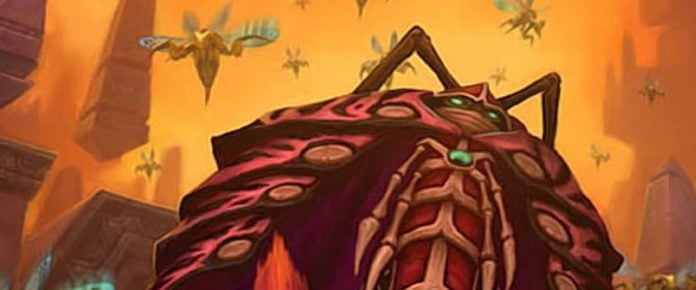
MMO dev Damion Schubert recently retweeted a thread penned by a user named Zarathustra that presents our Massively Overthinking discussion for the week. Now, I’m 5’1″ – meaning the closest I ever got to playing basketball was leading the band. But I was aware the game was changing, just not quite how much – and the visual makes it stark. I hope the parallel to video games is leaping out at you.

“As a game designer, you get the behavior you incentivize,” Schubert opined. “It just may take a while for the players to figure it out. In this case it took nearly 80 years.”
Of course, you didn’t come here to talk about basketball, and neither did we. Let’s Overthink it: Are players – or developers – optimizing the fun out of MMOs?
![]()
Brianna Royce (@nbrianna, blog): I realize this question can go in lots of different directions, which was intentional. When I saw this graphic on Twitter, it made so much sense to me. In sportsball, as in gaming, a lot of the excitement and drama and fun comes in the cracks between the regular, predictable gameplay. It’s when people screw up, miss a shot, block a pass, make a great save while leaping over a table, start a fight, fall down and fake an injury, piss off a ref, help a rival to her feet, wink at the crowd while setting up for a free-throw. The same is true in games. Any idiot can turn in a quest, kill 10 rats, queue for a dungeon – been there, done that. The most memorable bits are found in scoring a great plot for your house, making a new friend in the dungeon, making a server-first crafted item, leading your guild to PvP victory, finally ganking that jerk who’s been picking on newbies, soloing a group fight for a rare weapon, flirting in the cantina, winning a costume contest – the drama in the cracks of the game, the gaps in the mechanics, the spaces humans fill with human nonsense, the best kind of nonsense, the sticky and compelling kind.
Optimizing gameloops means tightening those gaps, narrowing them – sometimes in well-meaning ways because who wants designed downtime, right? – but we certainly lose some of the fun in the process. And pretty soon, the devs have gotten exactly the more mundane, predictable, monetizable behavior they designed for.
I’m not always sure the trade-off was worth it. In some games, sure. In others, no. And unfortunately, it hurts MMORPGs more than any other game.
As a side note, while basketball isn’t my thing, volleyball is, and it’s one of those sports that has been continually updated to deal with optimization problems. When I was first starting volleyball, for example, the libero position didn’t yet exist as a formality, and yet it thoroughly changes the game (and who gets to play it, slowing the “just get any freakishly tall person and train them to hit and block” decline of the sport). Baseball has undergone massive revision too! And on the flip side, there’s tennis, which continues to degrade as trainers optimize for the best body types to build for raw power instead of finesse. So don’t think basketball is alone here in this problem at all!
![]()
Chris Neal (@wolfyseyes, blog): Players arguably are the first to optimize the fun out of MMOs – that’s what meta builds and the associated gatekeeping ends up being all about in most cases – but then there is a solid argument that these things don’t happen until the devs’ vision is handed out to players at scale and they find out that their vision doesn’t track with the reality of that scale.
Avoiding that point of settling is ultimately the job of the developers to manage because if players find the “right” way to play, and that discovery proliferates to the point of demand, then the devs need to rattle the sand in the box around. And yes, I understand how that can open entire canneries’ worth of bees in its own way, but it’s generally just a better idea to do that than to see optimal transform into required, as that diagram displays.
Naturally this does assume that scales are… well, actually large. If there are meta pissing contests among the highest but most minimal number of players, then this is probably less of a problem than it appears in spite of that smaller playerbase’s caterwauling. In that case, the squeaky wheel should still see a bit of grease, but it should be tuned in such a way that the sand rattling is more targeted. In an ideal world, anyway.
![]()
Justin Olivetti (@Sypster, blog): It happens. If you’re a teacher and don’t tell kids where to sit in class the first day of school, by Day 3 they will have picked their seat for the whole year and never change. So sometimes for our own good or the good of others, we have to shake things up. “Disturb the meta,” so to speak. And MMORPGs are in a unique position to do that because they are ever-changing, ever-evolving games. Players and devs can shake things up through patches and events and initiatives. Look at how the WoW Hardcore community bucked against the optimized Classic experience to make a new path that was more chaotic and unpredictable and challenging.
![]()
Sam Kash (@thesamkash): I don’t think they’re optimizing the fun away. That sounds like the kind of argument that some players might use to argue that a game shouldn’t have a minimap or group finder – as if the fun was in screwing around for an hour waiting for the actual game you want to play to begin.
Of course, as I’m writing this, I think about how ArenaNet and other devs have tried to optimize their PvP rankings to put certain players with and against certain other ranked players. I guess in that case, yeah, they have ruined it. I still haven’t forgotten how terrible they implemented ranked PvP back in the 2015 era. So so bad.
![]()
Tyler Edwards (blog): As a player, I think this is only a problem if you let it be. It’s easy to fall into the trap of feeling like you have to do X, Y, and Z because that’s the optimal path (I often do myself), but it’s important to remind yourself that perfect optimization is unnecessary for most content. Keep perspective and just follow your joy.
For developers, it’s trickier. There will always be players who optimize every drop of fun out of the game, and those for whom the optimization is the fun. Trying to figure how to balance the game for them without ruining the experience for average players is one of the most difficult challenges of our genre, and one for which there is probably never going to be a single neat answer.
I do think, however, that often the best thing to do is just ignore those sorts of players, or at least de-prioritize them. Design for the majority, not the 1%.
I can’t be sure, but I have a feeling that’s what’s happened with New World. The game’s Reddit is awash in people screaming about the game is dying because there’s no content, ignoring all the content we have been getting lately (it’s not “real” content in their eyes). Again, I’m guessing, but knowing how data driven Amazon is, I think they just looked at the numbers and were like, “Well, these people are noisy, but they’re only like 3% of our players, so let’s just focus on making content for the other 97%.”
Of course, that noisiness can still be a problem. The bleeding edge optimizers may be a minority, but they can still dominate the narrative around a game. I think that more than anything else is what killed Anthem.
![]()
 Every week, join the Massively OP staff for Massively Overthinking column, a multi-writer roundtable in which we discuss the MMO industry topics du jour – and then invite you to join the fray in the comments. Overthinking it is literally the whole point. Your turn!
Every week, join the Massively OP staff for Massively Overthinking column, a multi-writer roundtable in which we discuss the MMO industry topics du jour – and then invite you to join the fray in the comments. Overthinking it is literally the whole point. Your turn!














